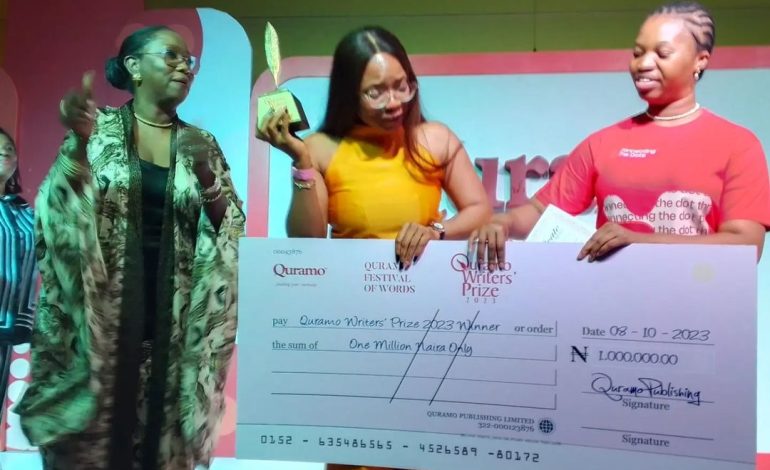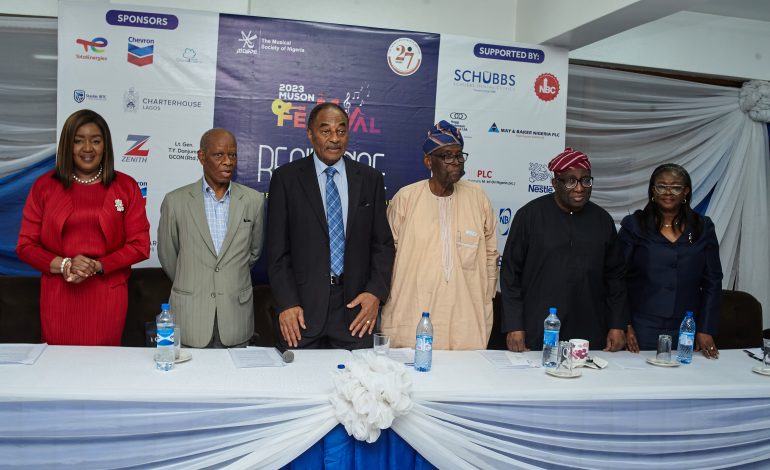Tension, excitement as Akubuiro, Gomba or Ojomu is set to clinch USD$100,000 literary prize money

By Anote Ajeluorou
TOMORROW, Friday, October 13, 2023, is decision day for three outstanding playwrights, whose works are up for scrutiny, with one certain to clinch the coveted star prize of USD$100,000. It has been six months of activities, starting from when entry submissions were called, to the long and short list in August, the CORA-NPL Book Party and now when the die seems cast. Baring announcement of cancellation, as it happened sometime on past two occasions, one of the three playwrights will smile home with a handsome USD$100,000, thus becoming the richest writer in Nigeria. With the dollar to the naira rate oscillating at over USD$1 to an all-time high N1,020, the winner will become an instant billionaire! Also, winner for The Nigeria Prize for Literary Criticism worth USD$10,000 will be announced. This year’s prize award has been tagged ‘Redefinition’ by the prize organisers and sponsors, Nigeria Liquified Natural Gas Ltd.
The three playwrights and their works in contention for the huge prize include the journalist and writer, Henry Akubuiro’s historical play, Yamtarawala – The Warrior King, academic and writer, Obari Gomba’s Grit and student engineer, Abideen Ojomu’s The Ojuelegba Crossroads. These three works survived a long of 11 other good plays to land at the edge of winning the prize. For personalities in the literary landscape and enthusiasts, there is palpable tension and excitement, as to who goes home with the golden diadem tomorrow when the sumptuous ceremony to announce the winner is due at Eko Hotel and Suits, Victoria Island, Lagos. The battle has been described as one among an engineer (Ojomu), media (Akubuiro) and academia (Gomba). So who wins it? That’s the question that will plague many a literary watchers till tomorrow night when the winner is announced.
A slight recap of what the plays are about and what their writers say about their creative products could help animate the excitement and tension already building up. First is a critic’s view of the three works, followed by testimonies from the three writers about their own works:
Akubuiro’s Yamtarawala -The Warrior King: “But Yamtarawala is a smart man or so he believed. Having been crowned king and settled into his royal role at Diwar, he suddenly feels uncomfortable with his own children and decides to put them to an unusual test of loyalty. He recalls how he was able to conquer the various kingdoms, the ugly roles the children of those kings unwittingly played to enable him discover the secret behind their initial invincibility from external aggression. He does not want to fall to such dirty tricks, with his own children as ally to military adventurists; he knows how vulnerable a king can be if a chink can be found among members of the royal household. So Yamtarawala sets a stone to boil in a pot and asks his children to pick it up with a fork if it goes soft. Only his youngest son Marivirahyel among his six children is able to perform the unusual feat. Yamtarawala is alarmed that his own son has become so powerfully fortified with juju and could possibly challenge him and stake a claim to the throne. He then sends men to kill him, but Marivirayhel is an unusual young man, much to his father’s dismay.”

Gomba’s Grit: “Gomba’s Grit can best be understood in the context of political symbolism, with Pa Nyimenu representing both a troubled nation and her blighted people on whom all manners of political rascality and betrayals are perennially visited. The two political parties promise heaven and earth but deliver nothing, especially the Democratic People’s Alliance. United Progressives Party is jostling to upstage it with purported good intentions by bringing in a supposedly good man, Okote, but there’s already sabotage of its own processes from within, as it enters into unholy alliance with its rival party just to deal with Pa Nyimenu and everything he represents. By this unholy alliance of dark forces by the two parties, the market women and the youth are conscripted into committing evil against Pa Nyimenu, who is both symbolic of a blighted nation and her hapless people through the conspiracy of the political parties and their actors.”
Ojomu’s The Ojuelegba Crossroads: “Ojomu’s The Ojuelegba Crossroads, although deploying a complex language and dense imageries, manages to unravel the complex wounds the Nigerian society has inflicted on itself, but ultimately, it comes to understand that the language of law and order is what invariably pays in any society, Nigeria particularly. Senator Gwewiri and his thieving governor accomplice are vanquished by the law that remains unrelenting in insisting on what is right and ensuring that it is done. Not even the enormous powers the duo wields stop the law from taking its course. Ojomu therefore replots the way back to a path his country has long abandoned for an alien one that has damaged her health almost irretrievably. But Ojomu shows faith in the judiciary in his dramaturgy. This is indeed a brave stand in an era where the power of the ballot has been weakened for the ascendancy of the judiciary which now determines the outcomes of national and state elections. Will the judiciary stand Ojomu’s test of faith? Only the future can tell.”
Akubuiro on Yamtarawala – The Warrior King: “Literature and history are Siamese twins. Historical literature is one of the dominant genres in literature. Some of the greatest writers in history have written literary classics based on history. In drama, this is common, especially Western drama. Don’t forget, the greatest work of literature in Africa, Things Fall Apart, is a work of history. In the play also, there is a leadership tussle in Kanem-Bornu that produces a loser in Yamtarawala – but not a bitter one where he had to fight his younger brother, Umar, to wrest power. His ambition to become a king himself sees him move away from the capital of Kanem-Bornu to find his own kingdom. You can see conflict resolution here. This ambition, however, comes with a high cost –bloodletting. His bloated ego and fear of the unknown after assuming the reins of power also lead to his eventual tragedy, which is a big lesson to today’s leaders.”
Gomba on Grit: “Have you ever considered what it would have looked like if those works were not written? It’s easy to stand where we are now and assume that because the works are not carrying knives, shovels and guns, and they are just tied to paper, and we forget that there’s a subtle process by which literature brings about change. So, if you want to evaluate what the impact of literature is, you should also have the capacity to evaluate what the absence of literature is. If we are relating that to Nigeria, I believe our society has profited more from our creativity, not just the promotion of culture, but the capacity of literature to make commentary on our social space. Where we will go from now in the next 10 to 15 years will depend on how we are able to translate social commentary or literary presentation to a certain kind of political action which will drive change.”
Ojomu on The Ojuelegba Crossroads: “Ojuelegba is a very important place not only in Lagos but on the African continent due to its peculiar and cultural antecedent. It has been a point of cultural convergence as our ancestors venerate the “elegba or Legba” deity at this location. Over the centuries, development stretches it steel and concrete limbs across the remote forest, and Ojubo-Elegba now shortened to Ojuelegba finds itself at a very important crossroads connecting important settlements at its four cardinals. These bordering settlements advanced as a result of social imperatives, but the crossroad remains a bottleneck thereby preventing the consolidation of the disparate developments into a single formidable whole. The crossroads can no longer hold up in its primary responsibility of providing the required link for the stronger whole. Based on the existential and development crises posed by the crossroad at which every African nation finds itself, it is required to find new ways to resolve this impasse.”
Of course, may the best work win!



